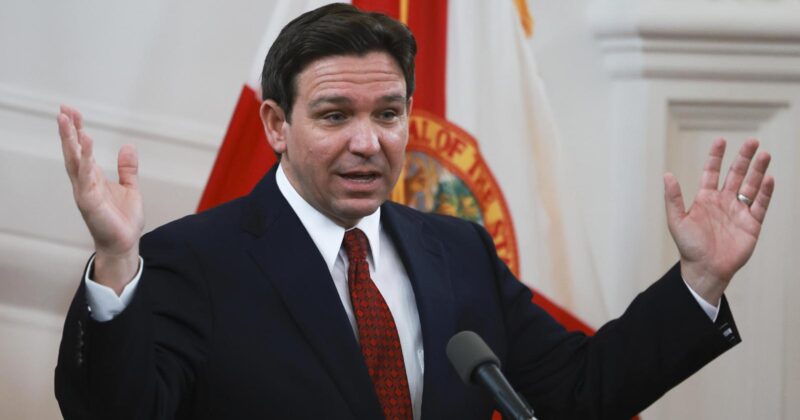Florida Governor Ron DeSantis provided an update on his criteria for candidates seeking to fill the Sunshine State’s soon-to-be open Senate seat. The seat is currently held by Senator Marco Rubio (R-FL), who has been nominated to serve as Secretary of State by President-elect Donald Trump. Rubio is expected to be confirmed with relative ease, leaving DeSantis with an important decision to make.
While speaking to reporters on Tuesday, DeSantis refused to name any specific candidates, though he did list a number of requirements he is seeking in an eventual replacement. Chief among them was the issue of H-1b visas, a special immigration status that is supposed to be handed out to high-skill immigrants to fill jobs in important industries. The issue sparked a massive debate among the Trump base last month, with tech leader Elon Musk and former Republican presidential candidate Vivek Ramaswamy emerging as leading supporters of H-1B expansion.
Others argued that H-1B visas undercut American wages and encourage companies to replace American workers with cheap foreign labor. The definition of “high-skilled” has also come into question, as separate visa classifications already exist to bring in a limited number “exceptional” talent. The system has also been rife with abuse in recent years, something Musk and the president-elect have acknowledged.
DeSantis finds himself firmly in the latter camp, telling reporters that opposition to H-1B expansion should be a top priority for Marco Rubio’s Senate replacement. Reforming such programs is essential to ensuring that visas aren’t being used to “undermine American workers,” the governor told reporters. “We should have merit-based [immigration]. We shouldn’t have massive chain migration. All of these things I think we’ve got to get this right, once and for all.”
A number of candidates have emerged in the week’s since Rubio’s nomination. Lara Trump — the president-elect’s daughter-in-law who most recently oversaw a successful general election campaign as co-chair of the Republican National Committee — was initially viewed as a potential candidate to fill the seat. Trump initially expressed interest in seeking the position and has stated that she intends to remain involved in politics, though she opted to formally remove her name from consideration in a video statement last month.
Additional candidates include Florida Attorney General Ashley Moody, a staunch ally of DeSantis and a supporter of President-elect Trump. Moody recently made national headlines by bringing state attempted murder charges against accused would-be-Trump assassin Ryan Routh, who allegedly attempted to kill Trump at his West Palm Beach golf course this past summer. While Routh has been hit with a number of federal charges — including attempting to kill a former president and several firearms charges — the state charges stem from a car accident that was caused while Routh attempted to make his escape.
“When you couple those terrible injuries together with [Routh’s] other criminal conduct, which we believe rises to the level of domestic terrorism, it turns his actions into an attempted felony murder case,” Moody said during a press conference last month. The attorney general’s office had previously reached out to federal prosecutors about pursuing the attempted murder charge, though they were not interested and advised Moody not to file state charges. Routh currently faces life in prison if convicted in either case.
Along with Moody, other potential candidates to serve as Marco Rubio’s Senate replacement include Lieutenant Governor Jeanette Nuñez, former Florida House Speaker Jose Oliva and State Senator Jay Collins. James Uthmeier, who currently serves as Governor DeSantis’ Chief of Staff, has also been viewed as a potential replacement. If Uthmeir is indeed selected, political exporters have widely speculated that he would be serving as a placeholder for DeSantis, who could run for the seat when he terms out as governor in 2026. If DeSantis opts to run, he would join Junior Senator Rick Scott (R-FL), previously served as governor before running for his current position.
While DeSantis acknowledged that he has been reviewing a number of candidates, he refused to give specifics when asked about specific names, including Moody.“I’m not going to be refereeing any ‘who’s in, who’s out,’ but I will say that we’ve done a lot of research on candidates. I think that we’ve got a lot of great people in Florida who’ve made a big difference. We also have certain issues that are very, very significant,” the governor told reporters with a laugh. “And when I put out my statement after the vacancy was potentially there with Sen. Rubio’s nomination, I said ‘We have to deliver on the mandate that the voters gave President Donald Trump.’”
The eventual candidate will serve in the position until 2026, when they will then go before Florida voters in a special election scheduled for November. There will then be another regular scheduled election for that Senate seat in 2028.
Rubio has not yet resigned from the Senate, though his Senate confirmation hearing is currently slated for January 15.

